From finding her majors to becoming a changemaker
Doors opened for Carolyn Carlic
Experiences in college — including getting guidance to find a major and minors that match her interests, traveling on Nazareth's guided Civil Rights Journey, and doing research and an internship — have opened doors for Carolyn Carlic '23 to see how she can be a changemaker and have prompted her to take action.
As a junior, she shared these highlights from her time at Nazareth so far, saying her courses, mentoring by faculty and staff, and her Naz-supported learning in the community have built on each other to shape her life's work.
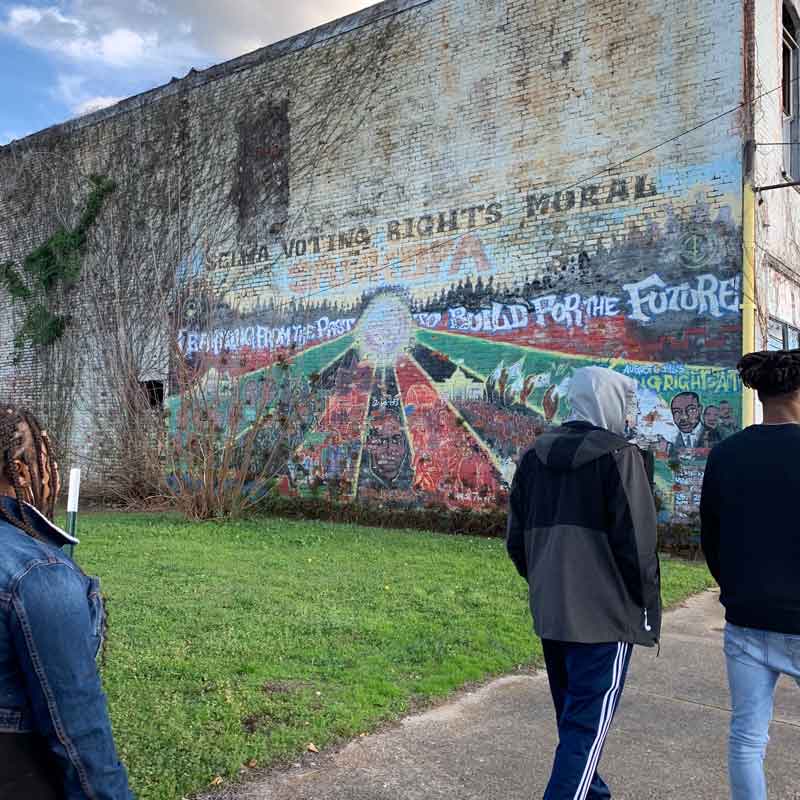
After just one semester of college, Carolyn went on Nazareth's week-long Civil Rights Journey trip to historical sites in Alabama, Mississippi, and Tennessee. This mural in Selma advocated for voting rights.
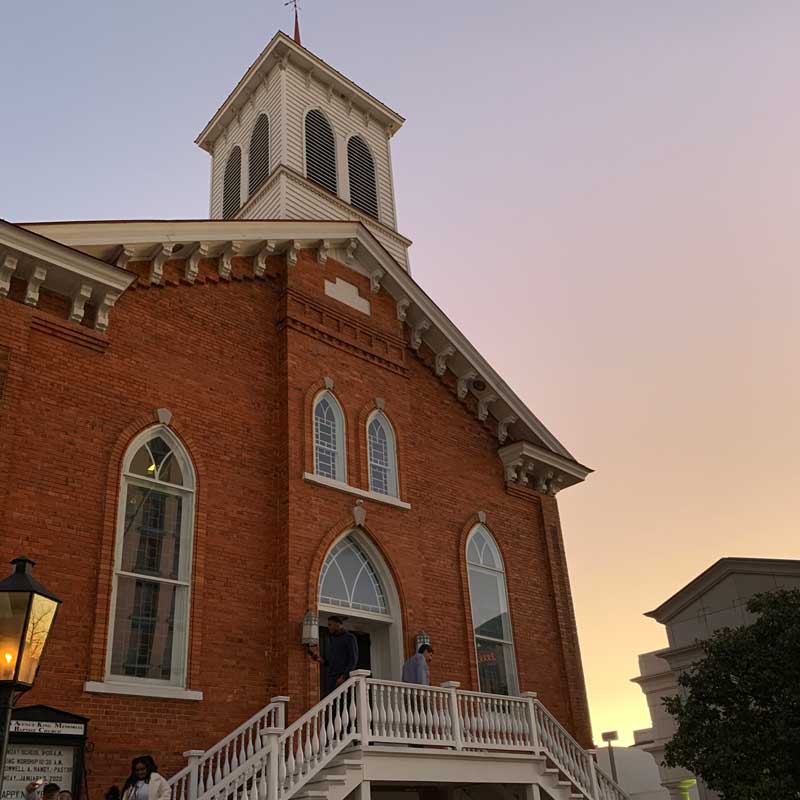
The trip also visited Dexter Avenue King Memorial Baptist Church in Montgomery, Alabama, where Rev. Martin Luther King Jr. served as pastor from 1954-1960.
Finding her majors
After planning to pursue physical therapy, Carolyn switched to undeclared before she arrived on campus. “The undeclared program here at Naz (now called Open Path) is so good,” she says. Her undeclared-program advisor, her core courses (called Perspectives-Enduring Questions or P-EQs), and her first-semester Academic and College Success class gave her ideas and interesting content to explore.
Hearing of Carolyn’s love for science and the outdoors, her religious studies professor — Susan Nowak, Ph.D., SSJ — connected her to the director of the environmental science & sustainability program. That conversation led to Carolyn declaring environmental science & sustainability as her major and having a summer research experience investigating lead in soil and water at urban and rural community gardens where food is grown around Rochester.
She is also pursuing a religious studies major and minors in biology and sociology.
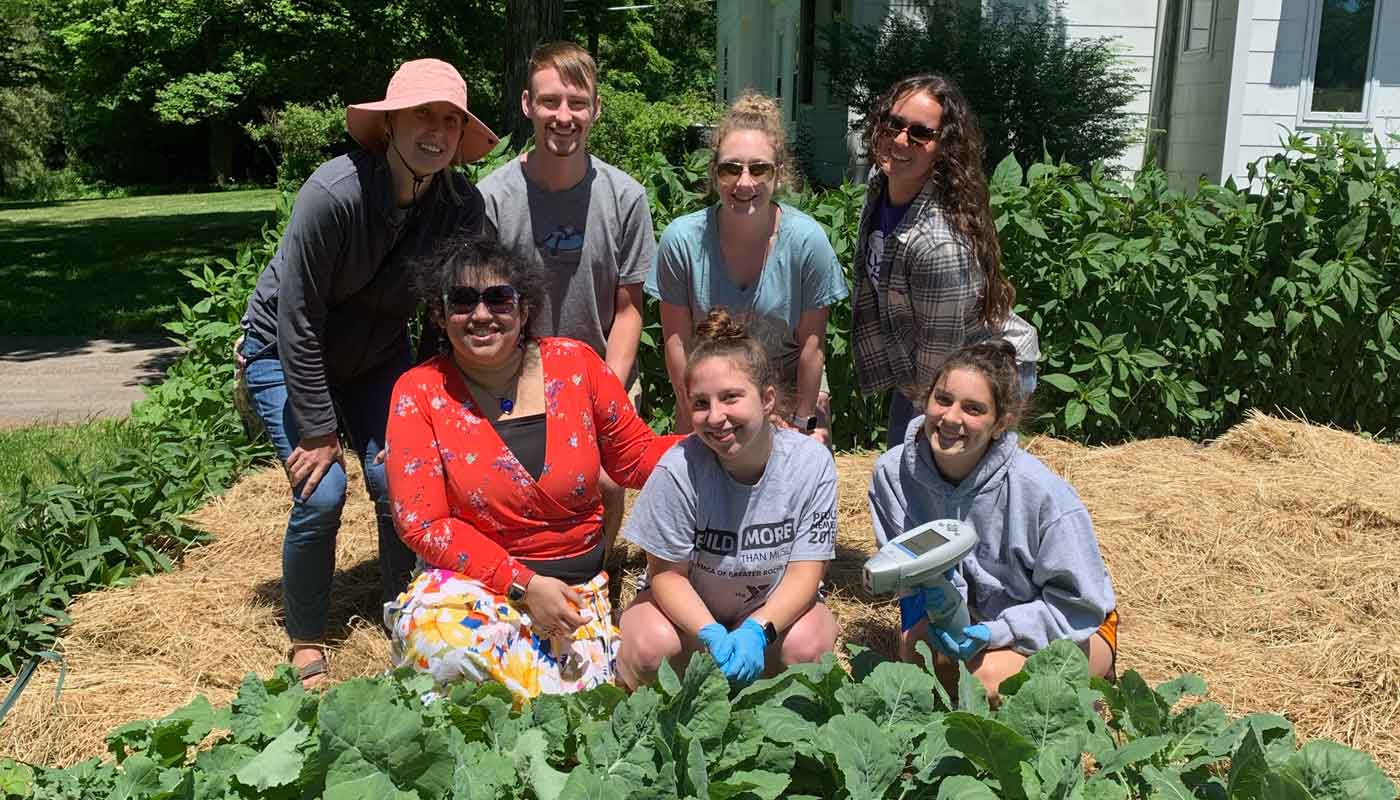
Summer 2021 Naz research group: (left to right, from top) Stephanie Zamule, Ph.D.; Ben Lyon; Emma Baker; Madelyn Vegder; Padmini Das, Ph.D.; Maddie Willett; Carolyn Carlic
Civil Rights Journey trip
Carolyn took to heart a strong message from her new-student orientation activities and her Academic and College Success course: "Don't say no. Say yes, because it can open doors."
After just one semester of college, she went on Nazareth's week-long Civil Rights Journey trip to historical sites in Alabama, Mississippi, and Tennessee — which included talking with people who were part of renowned activism. "The civil rights movement really wasn't that long ago," she points out. Turning the corner in a museum and seeing an old, stained Ku Klux Klan robe on display was an emotional moment that she still thinks about. "That suit was the embodiment of hate for me, for all the evilness we encounter." She wonders: What if I was alive in the 1960s? What would I have done? Carolyn says she examined her own biases and has worked to change and to be a better ally.
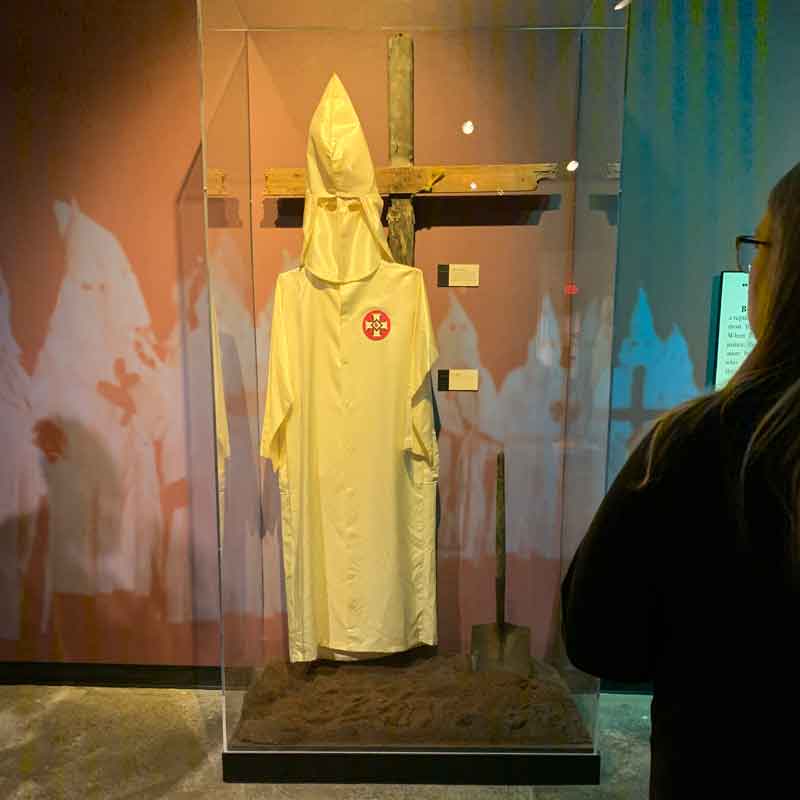
The Klu Klux Klan robe Carolyn saw at a museum in Alabama.
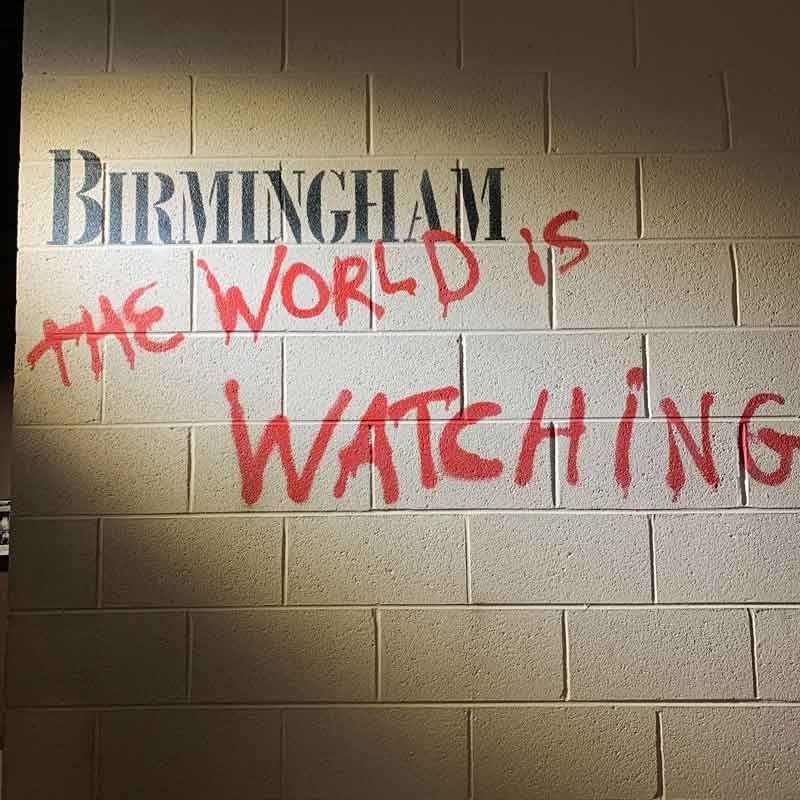
An art exhibit in one of the museums on the Civil Rights Journey.
"The trip literally changed my life. It opened my eyes to everything the textbooks didn't tell us regarding race and injustices," she says. Along with forming bonds with other students on the trip, she says, "I got to know myself better. I'm not afraid of starting difficult conversations. You've got to have the difficult conversations."
She also was struck by visiting a desolate town where people didn't have running water or recycling services. That experience shaped her career plans to focus on social issues in environmental science: "That's when I knew I wanted to do climate justice."
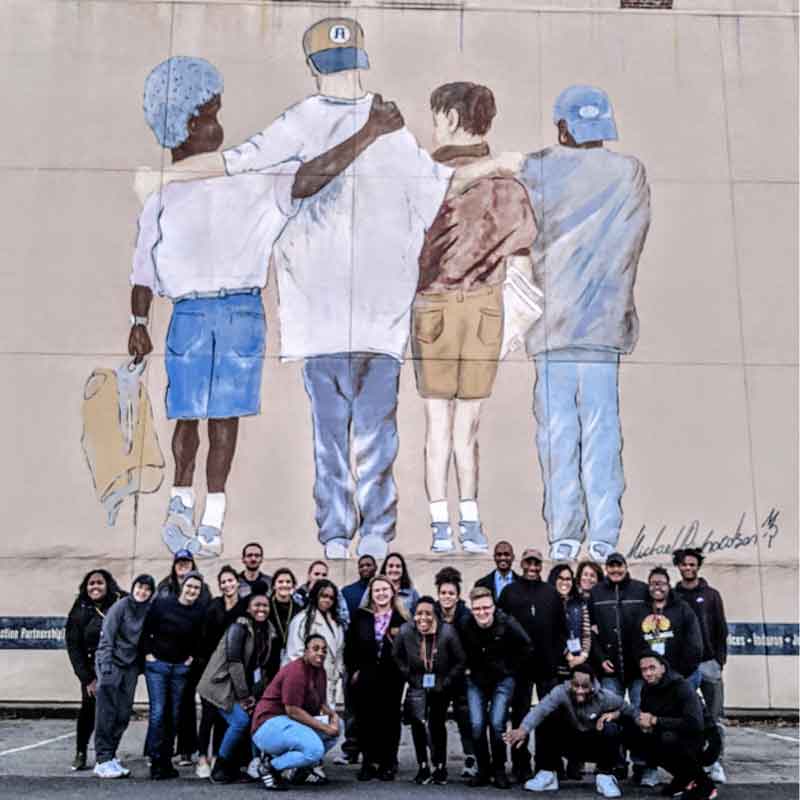
Civil Rights Journey Group in front of mural in Birmingham, Alabama
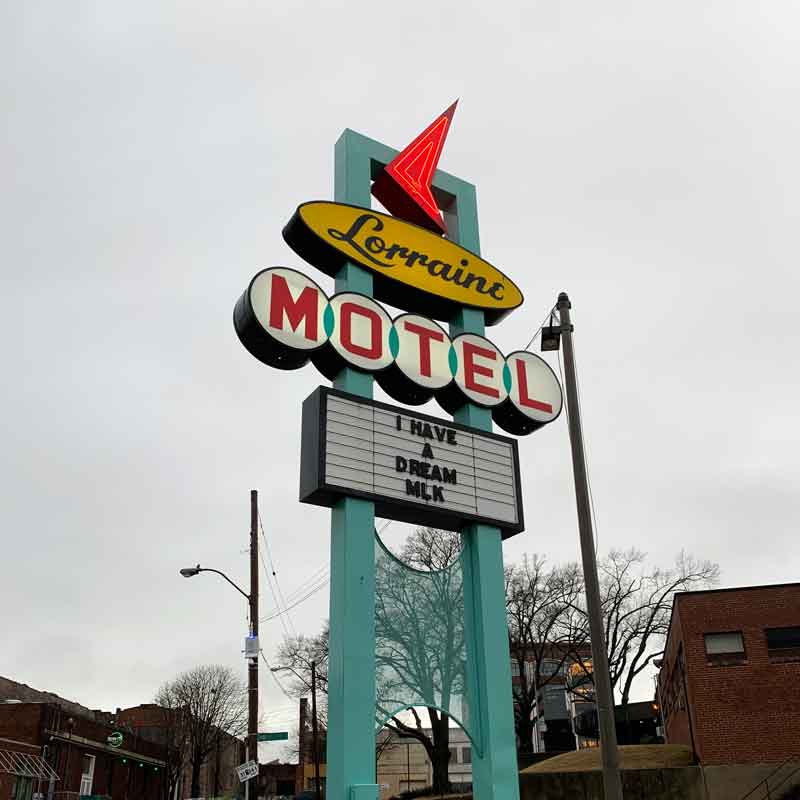
The Lorraine Motel, where Dr. King was assassinated in 1968 in Memphis, Tennessee, is now a civil rights museum.
Taking action
The summer after her first year of college, when the murder of George Floyd by a Minneapolis police officer prompted the largest racial justice protests in generations, Carolyn heard no conversations happening in her nearly all-white hometown near Syracuse, New York. She organized a Black Lives Matter rally and says, "I would not have done that if I didn't go on that civil rights trip."
About 15 white people gathered with her on a corner with signs, which led to discussions in a local Facebook group. After that, she noticed Black Lives Matter signs appear around town.
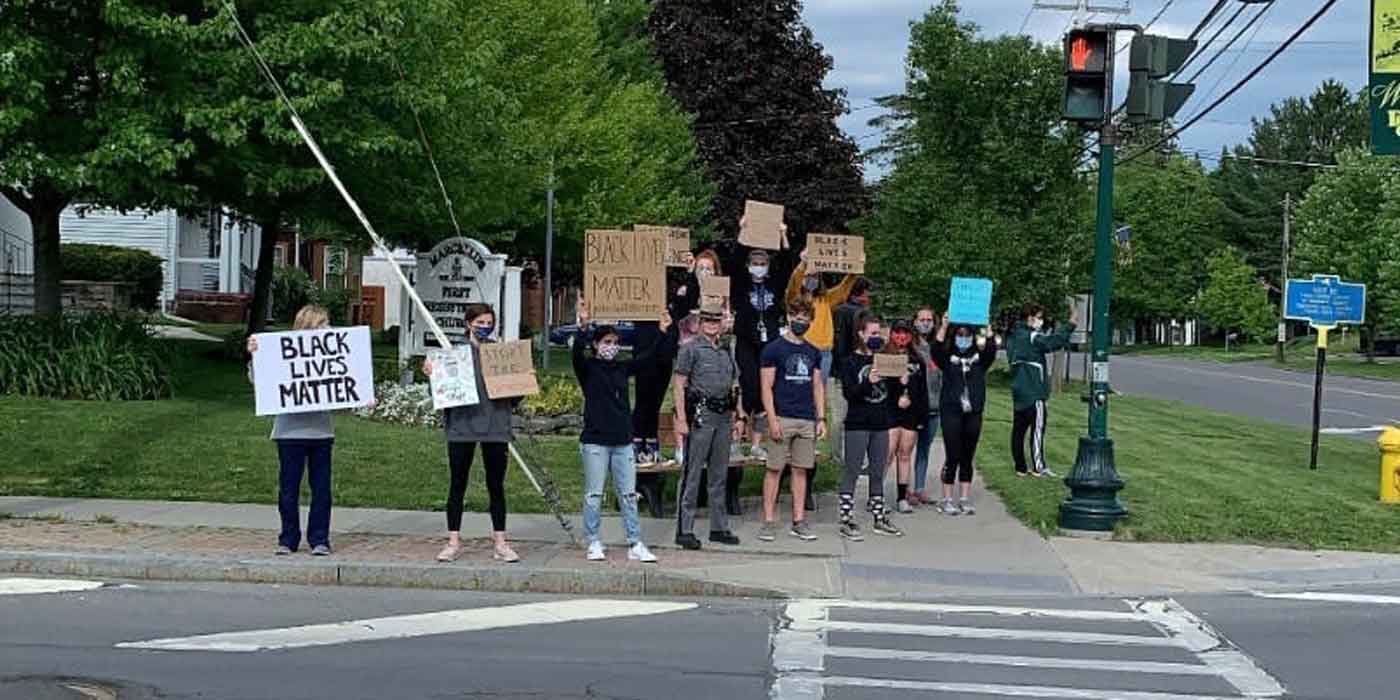
Black Lives Matter protest in Marcellus, NY.
She continues to think about the lyrics from the spiritual “This Little Light of Mine,” which the group sang on the civil rights trip, asking herself: “What’s my light, and how am I going to carry it through? How am I going to shine it and show it?”
She plans to continue learning by going on a Nazareth trip to Germany and Poland in 2022 to study the Holocaust: The March: Bearing Witness to Hope.
Carolyn also pursued environmental research the summer after sophomore year, with a professor and Foodlink (community partner), testing land in Rochester where refugees grow culturally appropriate food.
Internship connects religious studies and the environment
Carolyn has been fascinated by religious studies courses about encountering evil, genocide, and social justice and religion. “They all help me reflect on myself,” she said. She wanted to explore how religion and environmental science connect, so Nazareth religious studies professors Susan Nowak and Thom Donlin-Smith, Ph.D., helped connect her to Phyllis Tierney, SSJ, at the Sisters of St. Joseph’s Justice & Peace Office just off campus for an internship in fall 2021. Through research, writing for their newsletter, creating educational bulletin boards, and taking action, she’s helping the SSJ community pursue Pope Francis’ call (in his second encyclical, called Laudato si') to care for creation and the planet.
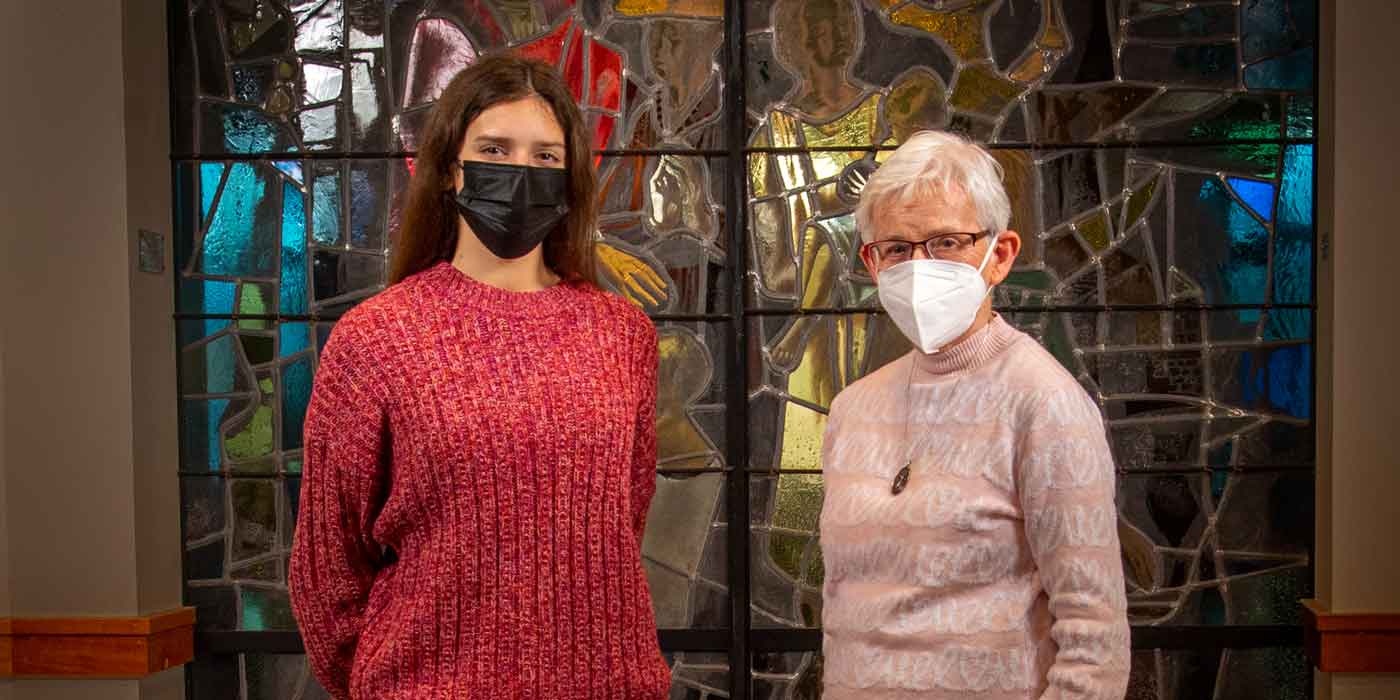
Carolyn Carlic and Phyllis Tierney, SSJ.
Carolyn has worked with the sisters to begin meatless Mondays and launch a composting partnership with a local business. She has shared information on recycling and on neighborhood food deserts. She interviewed sisters from Brazil to inform others about water issues there.
"I gained a lot more confidence in myself," says Carolyn, saying her toolbox of skills has grown in many ways during college. "I've been able to speak to so many different people — including a different generation. I've become better at public speaking."
Another plus of the internship: "It's helped me see that I really like the educational side of environmental science." One of the sisters linked her to a local school where another sister is the principal, inviting her to teach about the environment to a fourth-grade class. "The connections from the sisters helped me to learn more about my career path and the different directions I could possibly go."
Listen
Carolyn talked about the Civil Rights Journey as a panelist on the Prez Paul podcast in March 2021.